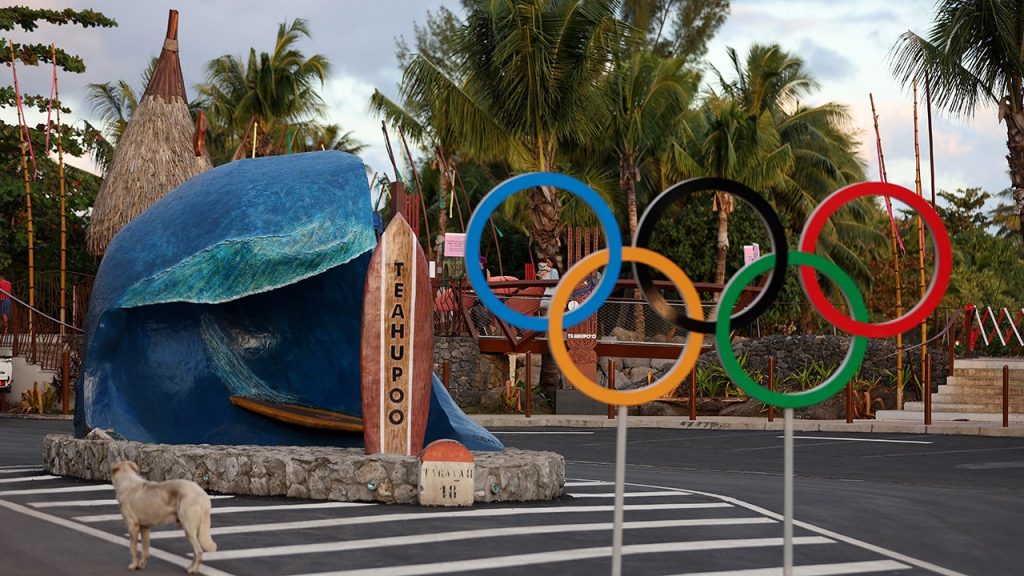An Olympic surfing judge from Australia, Benjamin Lowe, was removed from the judging panel during the Olympic Games after a photo surfaced online showing him socializing with Australian surfing team member Ethan Ewing and coach Bede Durbidge in Tahiti. The International Surfing Association (ISA) made the decision to remove Lowe in order to protect the integrity and fairness of the ongoing competition. The ISA released a statement explaining that it is inappropriate for a judge to be seen interacting in that manner with an athlete and their team, in accordance with the organization’s code of conduct and the International Olympic Committee’s code of ethics. The surfing federation reminded all judges and teams of their responsibilities regarding appropriate behavior.
Ethan Ewing, the Australian surfer in the controversial photo, expressed sadness over Lowe’s removal, saying he was unaware of the details and did not have any insight into the situation. Ewing had lost his quarterfinal match to fellow Australian Jack Robinson, despite the controversy surrounding Lowe. The surfing competitions were taking place in Tahiti, which is far removed from Australia and Paris, where the Olympics are typically based. The incident with Lowe is just one example of the controversies that have arisen during the Games, including a boxer who faced criticism for failing a gender test in the past dominating the women’s 66-kilogram division.
The ISA’s decision to remove Lowe from the judging panel highlights the importance of upholding the integrity and fairness of Olympic competitions. The organization took swift action in response to the photo showing Lowe, Ewing, and Durbidge together, stating that it is not appropriate for a judge to engage socially with athletes and their teams. The incident serves as a reminder to all judges and teams of the necessity to adhere to codes of conduct and ethics set forth by the ISA and the International Olympic Committee. Ewing’s reaction to the situation reflects the impact it had on the surfing competition during the Games.
The controversy surrounding Lowe’s removal sheds light on the challenges and scrutiny faced by judges and officials in Olympic competitions. With the intense focus on maintaining fairness and honesty in judging, any perception of bias or inappropriate behavior can have significant consequences. In this case, the ISA’s decision to remove Lowe from his role as a judge was intended to uphold the standards expected at the Olympic Games. The incident also underscores the need for clear guidelines and reminders to judges and teams regarding their responsibilities in maintaining appropriate behavior and interactions during the competition.
The incident involving Lowe, Ewing, and Durbidge is just one example of the controversies that have impacted the Olympic Games. The competition in Tahiti has been marred by various issues, including the revelation of the photo leading to Lowe’s removal. The pressure and scrutiny placed on athletes, coaches, and officials can sometimes result in missteps or controversies that overshadow the sporting events themselves. As the Olympics continue, it is essential for all involved to remain vigilant in upholding the values and standards of fair play, integrity, and respect that are integral to the spirit of the Games.
In light of the incident involving Lowe’s departure, the surfing competitions in Tahiti and the overall Olympic Games serve as a platform for reflection on the complexities and challenges of overseeing and participating in such high-stakes sporting events. The ISA’s response to the situation involving Lowe demonstrates a commitment to maintaining the integrity and fairness of the competitions, despite the controversies that may arise. As the Games progress and athletes continue to compete, it is essential for all involved to uphold the values of sportsmanship, respect, and honesty that are central to the Olympic ideal. By learning from incidents like this and reinforcing the importance of ethical conduct, the Olympic community can strive to ensure that the focus remains on the athletes and their achievements on the global stage.


